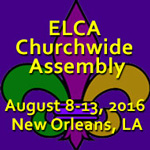There is no curtain obscuring plots

Rumors, politics on three issues at odds with true discernment
A MONTHLY MESSAGE FROM THE ELCA PRESIDING BISHOP
At a Conference of Bishops meeting a few years after the 2009 Churchwide Assembly, bishops shared some of the most outrageous suspicions they had heard about the churchwide office. One bishop said a woman from his synod was convinced that churchwide staff performed animal sacrifices in the Lutheran Center. This, of course, is untrue. Building management would never allow it.

I’ve been told that decisions have already been made by churchwide staff about these issues and that any conversation is just a charade. Higgins Road strikes again.
While this might be one of the most outlandish accusations leveled against your churchwide staff, it’s not an isolated or infrequent occurrence. After nearly two years as presiding bishop, it still amazes me that members of this church are convinced we are capable of and, in fact, carry out the most Machiavellian schemes. At present three examples come to mind: the conversation about our sacramental practice, our deliberation about unifying the three word and service rosters into one, and the entrance rite into this possible unified roster. I’ve been told that decisions have already been made by churchwide staff about these issues and that any conversation is just a charade. Higgins Road strikes again.
Let’s take a look at the conversation around sacramental practice. It began with a memorial from the Northern Illinois Synod to the 2013 Churchwide Assembly. I asked the good people of that synod and their bishop, Gary Wollersheim, what they had in mind. Recognizing that there was a range of practices, particularly with the invitation to receive communion (everyone, the baptized or the confirmed), and being fairly certain that their synod wasn’t alone in this, they wanted to call all of us into a deeper awareness of our sacramental practice and to study together the resource “The Use of the Means of Grace” (at www.elca.org). We were not nor are we going to vote on communion.
And the proposal to combine the three word and service rosters (deaconesses, diaconal ministers, associates in ministry) into one unified roster has been a multiyear process involving them as well as pastors, bishops and the laity. Regular updates of a committee’s work have been given to the rostered communities, Church Council and Conference of Bishops. The proposal to unify the three rosters will be before the 2016 Churchwide Assembly.
As for the entrance rite for the proposed unified roster, will it be commissioning, consecration or ordination? This conversation and deliberation is so important and so closely bound up in the histories, pieties and church structure that are part of the ELCA. Time and space and a process had to be created so we could talk together, pray together and listen together as this church before we could possibly be ready to make a decision. We need time for discernment.

The churchwide assembly is not primarily a political process. It’s a process of communal spiritual discernment.
The churchwide assembly is a year away. Voting members have been elected during this spring’s synod assemblies. Memorials and resolutions have been debated and passed. More will come before synods during next year’s assembly season. When we gather as the church in assembly in New Orleans next August we will deliberate, attend hearings and vote. Robert’s Rules of Order will help us navigate through legislative sessions. Some groups might organize around particular issues or causes the way the youth and young adults did at the 2013 Churchwide Assembly around adding $4 million to Always Being Made New: The Campaign for the ELCA. That is well and good. God can use our best practices, even our political practices, to bring about God’s will for God’s people. But the churchwide assembly is not primarily a political process. It’s a process of communal spiritual discernment.
If we come to the 2016 Churchwide Assembly with votes counted and minds made up, how can we possibly be open to the movement of the Spirit? If we come tightly organized, then the assembly could be nothing more than us talking past each other. But, finding ourselves in Christ, it will not just be us in a convention hall but the living body of Christ guided by the Spirit and conformed to God’s will. That is a far more exciting, frightening and life-giving prospect than any of our human strategies or elaborate conspiracy theories. Besides, if I had the kind of power ascribed to me, I would use it to bring about a championship for a Cleveland sports team.
The Rev. Elizabeth A. Eaton
Presiding Bishop
Evangelical Lutheran Church in America
This column originally appeared in the August 2015 issue of The Lutheran magazine. Reprinted with permission.


